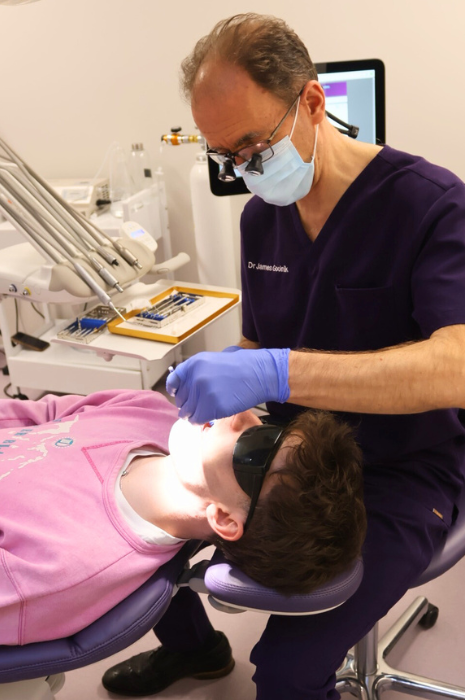If your teeth are starting to look longer or feel more sensitive than usual, you might be noticing the early signs of gum recession. The gum tissue surrounding your teeth is receding, exposing more of the tooth or even its root. Left alone, this can lead to further problems, including loose teeth or infection. Knowing how to stop gum recession early can make a real difference, especially when you take a balanced approach that includes both natural care and professional guidance.
What Causes Gum Recession?
Gum recession isn’t always caused by one single thing. It can develop slowly from a mix of daily habits or health conditions. The most common reasons include brushing too hard, using a toothbrush with stiff bristles, poor oral hygiene, gum disease, smoking, and even teeth grinding. Genetics and hormone changes may also play a role.
While some causes are outside your control, many of them can be managed with the right steps at home, and knowing when to involve your dentist is key.
How to Stop Gum Recession Naturally at Home
If your gums are just starting to recede or you’re at risk, there are a few gentle changes you can make that may help slow or stop the process.
1. Use the Right Toothbrush and Technique
Start by switching to a soft-bristle toothbrush. Brush gently using circular motions, not back-and-forth scrubbing. Hold the brush at a 45-degree angle to your gums and avoid pressing too hard. Twice a day is enough.
2. Choose a Gum-Supporting Toothpaste
Some toothpastes are too harsh and can wear down your enamel and gums. Choose one made for sensitive teeth or gum health. Look for ingredients like fluoride and aloe vera that help soothe irritated tissue.
3. Rinse with Warm Salt Water
A warm saltwater rinse can calm inflammation and support healing. Mix half a teaspoon of salt into a cup of warm water and rinse for 30 seconds. Do this once or twice a day.
4. Oil Pulling
This practice involves swishing coconut oil in your mouth for 10 to 20 minutes. It may help reduce harmful bacteria and improve gum health over time, though it shouldn’t replace brushing or flossing.
5. Stay Hydrated and Eat Well
Healthy gums need a good supply of nutrients. Drink plenty of water and include vitamin-rich foods in your diet. Leafy greens, berries, and crunchy vegetables support oral health and help clean the teeth naturally.
6. Avoid Tobacco Products
Smoking and chewing tobacco can damage gum tissue and slow healing. If you’re serious about learning how to stop gum recession, quitting tobacco is a must.
7. Manage Stress and Grinding
If you grind your teeth, particularly while sleeping, it can exert pressure on your gums. Try stress-reducing techniques like breathing exercises or consider a mouthguard at night to protect your teeth.
When Natural Remedies Aren’t Enough
While natural care can help early on, it won’t always be enough if your gums are already damaged. That’s when it’s time to involve a dental professional. They can offer treatments that go deeper than home remedies and actually stop further recession, or even repair it.
Here’s what your dentist might suggest:
1. Professional Cleanings
Routine cleanings help remove plaque and tartar, which are major causes of gum inflammation and recession. Your dentist will also check the depth of your gum pockets to track changes over time.
2. Deep Cleaning (Scaling and Root Planing)
This is a special kind of cleaning that goes beneath the gumline to remove bacteria and smooth the roots of your teeth. It gives gums a better chance to reattach and heal.
3. Gum Grafting
If the recession continues, your dentist might recommend gum graft surgery. A small piece of tissue is placed over the exposed area to protect the tooth and improve its appearance.
4. Desensitising Treatments
For people dealing with sensitive teeth due to gum recession, your dentist may apply a fluoride varnish or prescribe a desensitising toothpaste to ease discomfort.
Summary
Understanding how to stop gum recession starts with simple changes: brush gently, use the right products, rinse regularly, and stay mindful of your oral habits. Natural remedies can do a lot, especially in the early stages, but they’re not a replacement for seeing your dentist.
If your gums are already receding or you’re noticing sensitivity, bleeding, or changes in the way your teeth look or feel, don’t wait. Your dental team can help guide you through the right steps, whether that means deep cleaning, gum repair, or just routine support.
Gum recession doesn’t have to mean long-term damage. With a bit of care at home and help when needed, you can keep your smile healthy and strong.





Comments